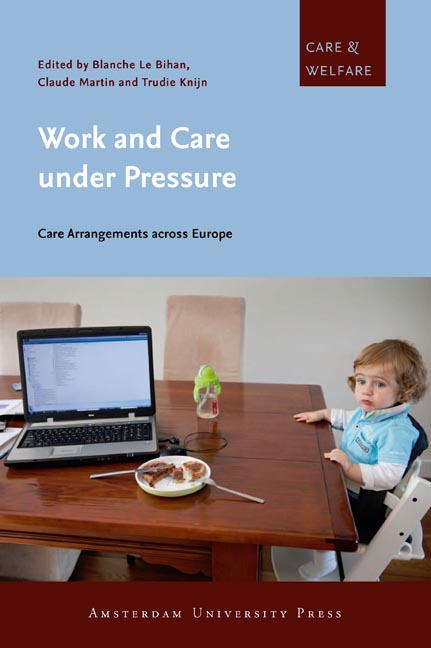Book contents
- Frontmatter
- Contents
- 1 Introduction: Workers under pressure and Social care Arrangements: A Research Framework
- 2 Work-family Balance in the Netherlands: Work and Care Culture Mediating Between Institutions and Practices
- 3 Negotiating Gender Equality, Atypical Work Hours and Caring Responsibilities: The case of Sweden
- 4 Caregiving and Paid work in Germany: The Impact of Social Inequality
- 5 Working Caregivers ‘Living Under Pressure’ in France
- 6 Negotiating Work and care in a Changing Welfare Regime: The case of Portugal
- 7 Blurring Boundaries and Clashing Loyalties: Working and caring in Italy
- 8 The changing mix of care in six European Countries
- About the Contributors
- Care & Welfare
6 - Negotiating Work and care in a Changing Welfare Regime: The case of Portugal
Published online by Cambridge University Press: 06 January 2021
- Frontmatter
- Contents
- 1 Introduction: Workers under pressure and Social care Arrangements: A Research Framework
- 2 Work-family Balance in the Netherlands: Work and Care Culture Mediating Between Institutions and Practices
- 3 Negotiating Gender Equality, Atypical Work Hours and Caring Responsibilities: The case of Sweden
- 4 Caregiving and Paid work in Germany: The Impact of Social Inequality
- 5 Working Caregivers ‘Living Under Pressure’ in France
- 6 Negotiating Work and care in a Changing Welfare Regime: The case of Portugal
- 7 Blurring Boundaries and Clashing Loyalties: Working and caring in Italy
- 8 The changing mix of care in six European Countries
- About the Contributors
- Care & Welfare
Summary
Introduction
The main aim of this chapter is to examine how families in Portugal caring for young children or old people in need of care reconcile their work and caring responsibilities. As in other southern European countries, important changes have taken place over the last few decades that have affected the balance between work and family life. Female activity rates have been rising since the 1960s, reaching 69 per cent in 2008, and changes in both the attitudes to and the economic behaviour of women have led to the continuing decline of the male breadwinner model. At the policy level, Portuguese society has been faced with the task of reorganising the care of children and old people, leading to developments in both leave policies and service provision.
Recent analysis of demographic and work-family trends reveals both commonalities and differences in relation to the southern European pattern (Wall & Escobedo 2010; Wall & Nunes 2010). Common factors include the ageing of the population and a growing demand for care, a certain feminisation of migrant flows and a strong ideological commitment to the family. What distinguishes Portugal from other southern European countries is the percentage of women working full-time, the high female participation rate in the labour market, a policy orientation emphasising gender equality, and the state's commitment from the 1980s to expand publicly subsidised care services.
The specificity of the Portuguese context represents a major research challenge. If the nature of work-family policies is evolving in specific ways, then it is important to understand how this process affects and interacts with the care norms and practices of families, in particular with the long-standing influence of a familialistic culture stressing strong intergenerational obligations. Drawing on a comprehensive perspective that emphasises the need to view family policies within a wider social, historical and normative context (Neyer et al. 2008), our approach seeks to understand how current care arrangements are embedded in changing policy, the labour market, the family and the gender culture.
The importance of path dependency, especially the impact of past policies and practices, must not be underestimated (Pfau-Effinger & Geissler 2005; Crompton 2006; Kamerman & Moss 2010). Work/family and gender equality policies were formulated comparatively late in Portugal.
- Type
- Chapter
- Information
- Work and Care under PressureCare Arrangements across Europe, pp. 125 - 150Publisher: Amsterdam University PressPrint publication year: 2013



